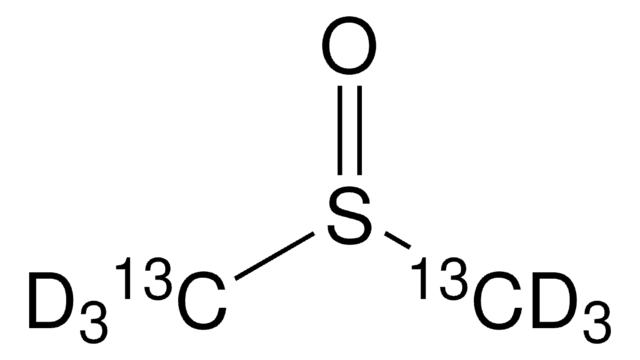156914
Dimethyl sulfoxide-d6
"100%", 99.96 atom % D
Synonym(s):
(Methyl sulfoxide)-d6, DMSO-d6, Hexadeuterodimethyl sulfoxide
About This Item
Recommended Products
vapor pressure
0.42 mmHg ( 20 °C)
Quality Level
isotopic purity
99.96 atom % D
Assay
≥99% (CP)
form
liquid
autoignition temp.
573 °F
expl. lim.
42 %
technique(s)
NMR: suitable
impurities
≤0.0250% water
water
refractive index
n20/D 1.476 (lit.)
bp
189 °C (lit.)
mp
20.2 °C (lit.)
density
1.190 g/mL at 25 °C (lit.)
mass shift
M+6
SMILES string
[2H]C([2H])([2H])S(=O)C([2H])([2H])[2H]
InChI
1S/C2H6OS/c1-4(2)3/h1-2H3/i1D3,2D3
InChI key
IAZDPXIOMUYVGZ-WFGJKAKNSA-N
Looking for similar products? Visit Product Comparison Guide
General description
Application
Recommended products
accessory
Storage Class Code
10 - Combustible liquids
WGK
WGK 1
Flash Point(F)
190.4 °F
Flash Point(C)
88 °C
Regulatory Listings
Regulatory Listings are mainly provided for chemical products. Only limited information can be provided here for non-chemical products. No entry means none of the components are listed. It is the user’s obligation to ensure the safe and legal use of the product.
FSL
Group 4: Flammable liquids
Type 3 petroleums
Hazardous rank III
Water soluble liquid
ISHL Indicated Name
Substances Subject to be Indicated Names
ISHL Notified Names
Substances Subject to be Notified Names
JAN Code
156914-10X0.75ML:
156914-10X0.8ML-N:
156914-5G:
156914-10X0.6ML-N:
156914-VAR:
156914-25G:
156914-1G:
156914-10X1ML:
156914-10X0.5ML:
156914-10X0.25ML:
156914-10X0.3ML-N:
156914-5X10G-N:
156914-BULK:
Choose from one of the most recent versions:
Already Own This Product?
Find documentation for the products that you have recently purchased in the Document Library.
Customers Also Viewed
Our team of scientists has experience in all areas of research including Life Science, Material Science, Chemical Synthesis, Chromatography, Analytical and many others.
Contact Technical Service

